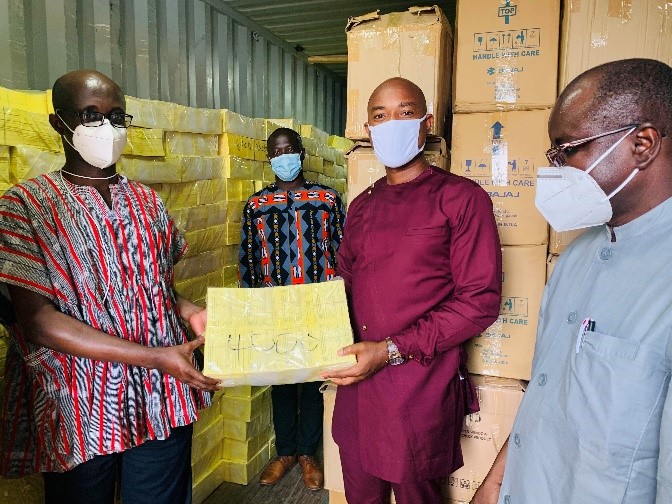Yellow Fever Vaccination Campaigns Continue Safely During COVID-19 Pandemic
Continuing safe yellow fever vaccination efforts are critical during the COVID-19 pandemic. A yellow fever outbreak amidst a pandemic would devastate already strained healthcare systems and lead to unnecessary lives lost. CDC, CDC Foundation, and their partners have been critical to ensuring public health professionals and vaccine recipients have access to resources needed to continue the global fight against yellow fever while reducing the risk of COVID-19.
CDC works globally to combat the threat of mosquito-borne diseases, including yellow fever which kills an estimated 30,000 people annually. As a World Health Organization (WHO) Collaborating Centre for Arboviral Reference and Research, CDC’s Arboviral Disease Branch contributes to WHO’s Eliminate Yellow Fever Epidemics (EYE) strategy. This strategy aims to end yellow fever outbreaks by 2026 through improved laboratory and epidemiologic surveillance, as well as improved vaccination coverage for people living in at risk areas. CDC staff provide technical assistance, conduct training and research, and seek funding for yellow fever vaccination campaigns in endemic countries, as needed.
Yellow fever is found in tropical and subtropical areas of Africa and South America and is spread to people by the bite of an infected mosquito. Illness ranges from a fever with aches and pains to severe disease with bleeding and yellowing skin (jaundice). There is no medicine to treat or cure infection. To prevent getting sick from yellow fever, people are encouraged to use insect repellent, wear long-sleeved shirts and long pants, and get vaccinated. More

Partners at CDC Ghana receive needed supplies for the yellow fever vaccination campaign thanks to work by DVBD and funding from CDC Foundation.
From left to right:
Dr. Kwame Amponsah-Achiano (Ghana Health Service), Fred Osei-Sarpong (WHO Ghana Country Office), Joseph Asamoah Frimpong (CDC Ghana), Dr. Fadinding Manneh (WHO Ghana Country Office)
In 2020, the COVID-19 pandemic threatened yellow fever prevention campaigns in many at-risk countries. As the pandemic continued to spread among resource-limited countries in Africa, preventing a secondary disease outbreak of yellow fever became increasingly important. However, the safety precautions needed due to COVID-19 presented an additional hurdle for WHO and its partners.
For example, a campaign targeting 5.6 million people in Ghana was planned for November 2020, but an assessment before the campaign start date showed inadequate personal protective equipment (PPE) and infection prevention and control (IPC) supplies to prevent COVID-19. An upcoming election further complicated the situation. Ghana uses a semi-permanent stamp to indicate who has already voted, which is similar to the stamp typically used during yellow fever vaccination campaigns. To avoid confusion, officials decided to use “yellow cards” to note who was vaccinated; however, this required additional supplies the country did not have.
The CDC Foundation worked quickly to procure the necessary PPE and IPC supplies, and yellow cards. The vaccination campaigns in Ghana were successfully completed in mid-November 2020. By the end of the seven-day campaign, more than 5.2 million people were vaccinated, resulting in 93.7% vaccination coverage in Ghana. These efforts ensured that all eligible persons in Ghana had access and received at least one dose of yellow fever vaccine, which will likely provide life-long immunity. Now, the procured funding and resources will also allow more yellow fever vaccination campaigns to move forward in Nigeria and the Democratic Republic of the Congo.
The COVID-19 pandemic has caused global, unprecedented disruption in all areas of life, including the delivery of health services like vaccinations. Thanks to support from CDC’s Arboviral Disease Branch, the CDC Foundation, and their partners, the risk of COVID-19 spread during the Ghana vaccination campaigns was reduced and millions of Ghanaians are now protected against yellow fever—ultimately diminishing the risk of deadly yellow fever outbreaks in the future.